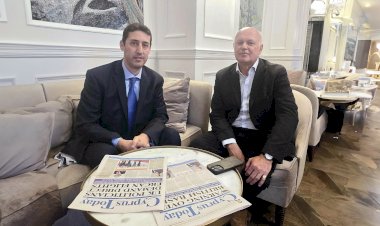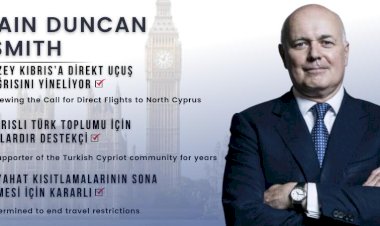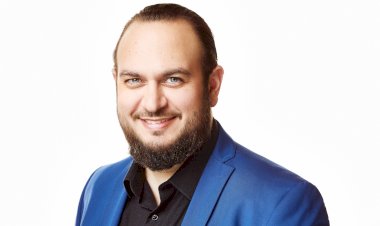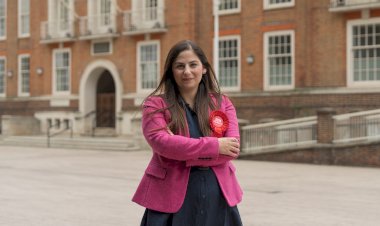British diplomat causes outrage
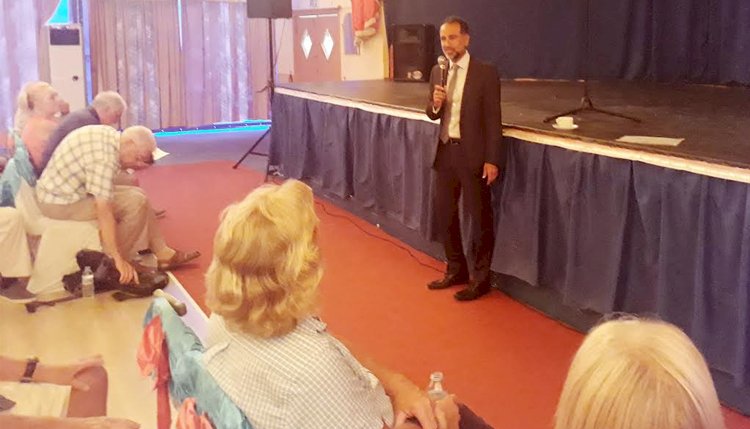
By ELTAN HALİL
THE United Kingdom’s most senior official in Cyprus, High Commissioner Irfan Siddiq, sparked outrage by referring to the second phase of the 1974 Turkish Peace Operation in Cyprus as a “land grab”.
Mr Siddiq, who also caused a stir by saying that the 1960 Republic of Cyprus Constitution is “no longer in effect” due to the changes “on the ground” caused by the Turkish intervention, made the highly controversial comment at a public event held in the Turkish Republic of Northern Cyprus.
He was speaking to a group of around a hundred British residents of North Cyprus who had been invited to a “town hall” style meeting at the Olive Tree Hotel in Çatalköy on Tuesday, June 27.
While Mr Siddiq has visited North Cyprus before to meet with the TRNC leadership and other Turkish Cypriots, this was the first time that Mr Siddiq, who took up his post last summer, has met publicly with members of the British expat community in the TRNC.
Speaking exclusively to Cyprus Today ahead of the event, the top British diplomat had said he is “conscious that there’s a large British resident community here in the North” and that he is “keen to keep good relations with them”.
“Because of the particular nature of the North, the fact that the self-declared TRNC is not recognised by anybody apart from Turkey, that does create some particular administrative challenges for the residents. So it’s important for us to understand that, which is why I’m here to meet with them.”
However the public gathering, which was also attended by two officials from the British High Commission in South Nicosia, was dominated by the Cyprus problem and the UK’s stance on it, with tensions running high at times.
Referring to the events of 1974 following a question from the audience, Mr Siddiq – who later attempted to prevent this newspaper from publishing his comments at the public meeting by claiming he had been speaking “off the record” and warning that there would be “consequences” if we did – said: “The reality is that the 1974 conflict, some would argue . . . the intervention was justified under the system of guarantees.
“From my reading of history, there were two phases to that operation, and arguably, the first phase [on July 20] was legitimate, and the second [on August 14] was a land grab.”
His use of the phrase “land grab”, which the Oxford dictionary describes as an “act of buying or taking land illegally or in a way that is considered morally wrong”, triggered outrage among members of the audience.
One man shouted “you’re talking absolute garbage” and recommended that Mr Siddiq “read this book”, The Death of Friendship by Turkish Cypriot Türkan Aziz, while others said “No” and continued to interrupt Mr Siddiq, who at one point threatened to walk out.
“If you would like me to speak then I’m happy to speak, if you would like to speak I can leave and you can speak,” he said.
Continuing to talk while being heckled by some members of the audience, Mr Siddiq added: “I understand it’s emotive and I said I respect the frustration, but there’s no facts in politics, there’s perceptions. So it’s a reality that there was a . . . Greek military junta that stimulated a coup [on July 15, 1974], and there was a risk of Enosis [union of Cyprus with Greece] which triggered a Turkish military intervention. . . At that point, there was a pause in the fighting and before any agreement could be reached, there was a second wave, which took a lot more territory and land.
“It’s clear that there wasn’t confidence on the Turkish side that any political agreement would be satisfactory and therefore they wanted to create a boundary that gave them strategic depth and allow the presence of more Turkish troops.
“Now my view of international law is that first intervention was arguably justified because it was a direct response to this risk of Enosis and a change to the Constitutional status, which enables and allows for military intervention by the guarantor powers.
“But they [Türkiye] did that to stop that risk [and] that risk was no longer there now once they’d come.
“The second phase was a policy decision. And that policy decision to try to create [a] strategic buffer has consequences, and the consequences, just like, and although people don’t like the analogy and the intervention and the justification is totally different, but there is a war going on in Ukraine now because Russia is trying to change borders. . . And there is no legally sanctioned way to change territorial boundaries without UN support.
“So what the TRNC, by declaring its independence, and what Turkey has done, by occupying a larger part of the land than the defensive operation to stop Enosis required, is create political facts on the ground which have consequences.
“And the consequences [are that] the TRNC is isolated because nobody will recognise it, because you cannot establish a state through a military operation – that’s what Russia’s trying to do in the Donbas region [of Ukraine].
“So as a consequence, the only way that this will be resolved is through a political negotiation. “And until there is a settlement, that means that the TRNC and the Turkish Cypriots will be isolated.
“That’s the unfortunate consequences of the way that the politics played out. Now that doesn’t mean that Turkish Cypriots don’t have rights, or shouldn’t be treated fairly, or shouldn’t have the same aspirations. Of course they have inherent rights as citizens of that united Cypriot state that was established in 1960.
“Now I know that a lot of people say that they were forced out [in 1963], therefore it’s not their fault, that’s a point of view I respect, but the reality is they’re not going to have the same rights until you have a settlement which is agreed, because nowhere in international law, in the UN, will anybody recognise that rights can be accrued through a military operation.
“And if that is an uncomfortable truth, I’m sorry to share an uncomfortable truth, but it is a truth, which is why there is such a strong reaction to any attempt to change borders by military force, as we’re seeing in Ukraine now.
“The justifications are totally different, but the reality is the same thing, that the world organises to protect the core principle of territorial integrity.”
Mr Siddiq’s comments regarding the second phase of the Turkish Peace Operation and likening it to Russia’s invasion of Ukraine will likely anger the TRNC and Türkiye, which say it was necessary to protect Turkish Cypriots, who had been forced into enclaves and were still at risk of massacre.
These included around 13,000 Turkish Cypriots who were besieged within the old walls of Gazimağusa until they were liberated by the Turkish Army on August 16, 1974.
In the period between July 20 and August 15, 1974, attacks continued on the Turkish Cypriot population.
The grim justification for the second phase of the Turkish military operation was further supported with the discovery of the mass graves of civilians, including young children, from villages such as Muratağa, Atlılar, Sandallar and Tochni (Taşkent).
Michael Stephen, a former British MP and barrister, listed the atrocities that had been committed against Turkish Cypriots across the island during the days between the first and second phases of the Peace Operation, and which were documented in detail by the international press, such as the Times, the Guardian, the Washington Post, the New York Times, France Soir, Die Zeit and the Daily Telegraph.
Providing written evidence to the House of Commons Foreign Affairs Select Committee as part of a 2004 inquiry into British government policy on Cyprus, he wrote: “Some people argue that having defeated the Sampson coup, and Makarios having returned to the Presidential Palace, Turkey should have withdrawn and left the Turkish Cypriots again at the mercy of Makarios, the man who had been responsible for the earlier massacres.
“That proposition has only to be stated for its absurdity to be appreciated. It must be remembered that UN troops had been in Cyprus since March 1964 and had failed to protect the Turkish Cypriots. The Turkish Cypriots were later to see what happened to the Muslim people of Srebrenica under international protection.
“Turkey could discharge its treaty obligation only by providing a safe haven for the Turkish Cypriots in which they could live in peace and freedom, and by encouraging them to reach a new political arrangement with the Greek Cypriots in which they could play their part as political equals in the government of the island.”
‘TRUST DEFICIT’
During the meeting with British residents, Mr Siddiq also said that the TRNC authorities have been taking a tougher stance when it comes to cooperating with the British and UN authorities on the island by “challenging the Greek Cypriot preference for a bicommunal solution”, such as ending bicommunal initiatives, which is: “Making the Greek Cypriots think that it’s not actually so comfortable to just sit on their seat and say ‘we’ll continue to isolate the Turkish Cypriots, they will feel the pain, at some point they’ll come and if they don’t, we’re fine anyway, so it doesn’t bother us’. I think that logic and that analysis is changing.”
He added that the new Greek Cypriot leader Nikos Christodoulides has been making it clear that the “status quo is not comfortable” and that “if something isn’t done to try to create a new push for a resumption of talks and resolution of the problem, there’s a risk that the North would be lost”.
Mr Siddiq continued: “I think that risk is becoming more and more real for the Greek Cypriots. “And therefore, I think despite there being a huge amount of scepticism, I think they are genuine when they say they want to resume talks and they really want to get an agreement.”
Stating that the “incentives and pressures” for a solution have changed since the last attempt in 2017, and referring to the “difficult economic situation” in Türkiye due to the devaluation of the Turkish lira, Mr Siddiq said there are “potential incentives that could be put on the table for Turkey” but that the “biggest problem at the moment” is the “massive lack of trust and confidence between the two sides” and that “something needs to be done to bridge that trust deficit”.
“And because the Turkish Cypriots and Turkey aren’t the ones who are advocating for a federal solution now, it probably needs to come from the Greek Cypriot side,” he said.
“In my discussions with the Greek Cypriot leadership, I think they’ve begun to internalise that they might need to do something. They’ve started with this pitch for a bigger EU role, which essentially is trying to make the benefits and incentives for Turkey through a better relationship with the EU clearer.”
With leadership elections this year in South Cyprus, Türkiye and Greece now over, Mr Siddiq said he believes a “window of opportunity” has now opened for the Greek Cypriot leadership to “try to breach that trust deficit and convince Turkish Cypriots and Turkey that it’s worth coming back to the table”.
TRNC TRYING TO ‘CAUSE PAIN’
Describing how the attitude of the TRNC authorities has shifted recently, Mr Siddiq said: “The self-declared TRNC wants to be recognised and wants to be normalised and have relations with the world.
“It doesn’t like the fact that nobody other than Turkey recognises it. So whereas in the past, maybe we had an understanding with the TRNC, and they tried to facilitate administrative challenges, because they wanted to have a relationship with us, I think they’ve got tired of waiting for us to accede to their position, and so they’ve shifted position a little bit.
“And they are in many cases, just like they’re doing with the Greek Cypriots, [where they are] deliberately creating problems where they can, for us . . . they’ve chosen to make things harder, and that’s a deliberate choice for them.
“And it’s consistent with their approach that ‘if people won’t support our vision of how we want to operate then, we won’t make things easy for you’.”
Giving one example of an area where, according to Mr Siddiq, the TRNC is making matters more difficult for British officials, he referred to the problem of children who are subject to court orders in the UK being abducted, usually by one of their parents, and taken to North Cyprus, an issue that has previously been reported by this newspaper.
“We often have situations where there are children who are potentially at risk in the North, [and] the caregivers [are] maybe not even in a fit state to support them.
“And we’ve asked for access to check that the children are OK, that they’re not being exploited or abused, and they won’t give us the access, don’t give us any information because they sort of hide behind a very draconian data protection law and say, ‘No, this is our responsibility. We’re not going to give you any assistance on this’.
“So it has very material impact, and we’ve asked them, it’s a humanitarian issue, it’s a safeguarding issue, [but] they’re not budging.
“So, unfortunately, on some of the other administrative issues where they have potentially the authority to make things easier for us . . . I don’t think that they are necessarily going to go out their way to make things easy for us because they want, just like with the Greek Cypriots, to cause pain for anybody in the world who is not adhering to or accepting their world view, that they should be recognised as a separate state.
“And we’ve had quite high level discussions with the Turkish Cypriot authorities on this, and they haven’t really budged.”
‘FRINGES AGAINST RECONCILIATION’
Responding to comments from another member of the audience about Greek Cypriot “ethnic cleansing” and Eoka terrorists, Mr Siddiq replied to applause from other attendees: “If you think all Greek Cypriots, the majority of them, are fascist terrorists – that’s what you sort of suggested, that they are terrorists – if you think that they are intrinsically inimical and have hatred towards Turkish Cypriots, and can’t reconcile, I respect your point of view. I don’t agree with that.
“I live on the South side. I meet our Greek Cypriots. I think people across the world are just people. And there’s history that creates bad blood. But we shouldn’t live in history because we’ll never progress.
“So I can see Turkish Cypriots keen to see reconciliation. I can see Greek Cypriots keen to see reconciliation. I can see some fringes who are against that, but I think they are fringes and they are the minority and I think we strive to work with the majority to try to create a better future.
“Now if you’ve given up on that, that’s your right, and I respect your position. I haven’t given up on that. And I’m going to work to try to realise that reconciliation. And maybe I’ll get nowhere as you think I will. But I’ll try and I’d rather spend my life trying to achieve better outcomes, than give up.”
‘VICTIMHOOD’
In response to another comment from a member of the audience about the difference between the content of history books provided to schools on both sides of Cyprus, Mr Siddiq had this to say: “There’s a contested history . . . and there are competing narratives. And what’s really interesting for me is that on both sides you have this sense of victimhood. It’s as clear on the other side as it is here.
“So here [the Turkish Cypriots are] numerically smaller feel like, you know, the Greek Cypriots are isolating and dominating [them] . . . and on the other side, they feel the same as a smaller number against Turkey, and Turkey is dominating. . . those competing narratives, and those different perceptions, are the root of the problem, because it means that people don’t understand the other.”
On the issue of increasing military ties between South Cyprus and the US and France, who are not guarantor countries of Cyprus, Mr Siddiq said the 1960 Constitution of the Republic of Cyprus does not prevent it from having relations with other countries.
He also said that following the UK’s exit from the European Union, British citizens are now “third country” nationals.
Mr Siddiq also denied that British citizens are being “discriminated” against for living in the TRNC, telling the audience: “You chose to come here knowing it is not a recognised state.”
During the public meeting, which lasted for well over an hour, other topics such as the one-day “TOM” car insurance for British citizens wanting to drive from the TRNC to South Cyprus, problems accessing the Waynes Keep Military Cemetery located in the UN Buffer Zone, end of life care and the ageing population, and passports and the urgent collection of travel documents were also discussed.
Mr Siddiq said he would be very happy to hold another meeting with British citizens to talk “less about history” and more about consular matters.
On the British Residents Society’s ongoing campaign to lobby the British government and MPs to end the isolation of North Cyprus, Mr Siddiq said “good luck with that”.
‘GLARING ERRORS’
British Residents Society chairman Julian Mawdesley, who was among those who listened to what Mr Siddiq had to say, said the High Commissioner “brought no new surprises” for residents living in North Cyprus.
Sharing his “personal interpretation” of the gathering, Mr Mawdesley said Mr Siddiq is on a “hiding to nothing when it comes to the TRNC”.
“We all need to understand that no matter what the British High Commissioner thinks personally, he is the representative of the British Government and has to support ‘the party line’.
“Yes, he made some glaring errors on history and land ownership, for which the attendees were quick to jump on, but how much of this comes from advisers?”
Mr Siddiq’s public meeting with British people living in North Cyprus is believed to be the first since a former high commissioner, Matthew Kidd, met with British residents at the Le Chateau Lambousa hotel in Lapta in October 2017.
That too created controversy, when Mr Kidd said that international recognition of the TRNC would be “dangerous”, leading to life peer Lord Maginnis asking the British government in Parliament if it would be taking any “disciplinary action” against Mr Kidd.
This story first appeared in the print edition of Cyprus Today dated July 1, 2023.
-
 Lucien SullowayHaving read summaries of the meeting between the British High Commissoner and the BRS, my main perception is that both sides will need to have worked out a united policy among their own respective members . I would be so hopeful if this led to a common goal the recognition of a Turkish Cypriot state, as equal partners in the in the cooperation of improving the existence of both sides which could lead to a union.
Lucien SullowayHaving read summaries of the meeting between the British High Commissoner and the BRS, my main perception is that both sides will need to have worked out a united policy among their own respective members . I would be so hopeful if this led to a common goal the recognition of a Turkish Cypriot state, as equal partners in the in the cooperation of improving the existence of both sides which could lead to a union. -
 Olwyn PattersonCongratulations, Cyprus Today. The Free Press of Cyprus.
Olwyn PattersonCongratulations, Cyprus Today. The Free Press of Cyprus.

